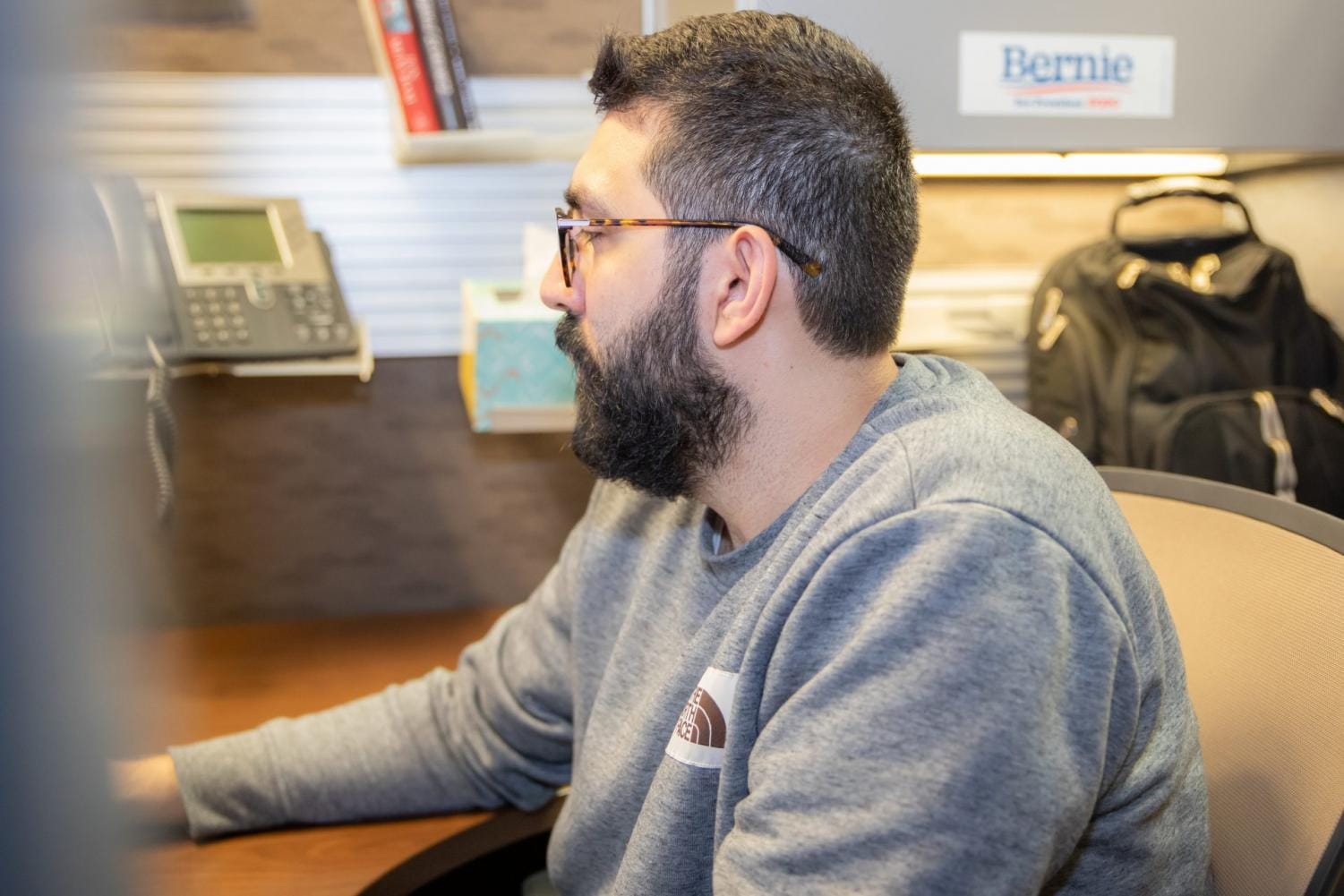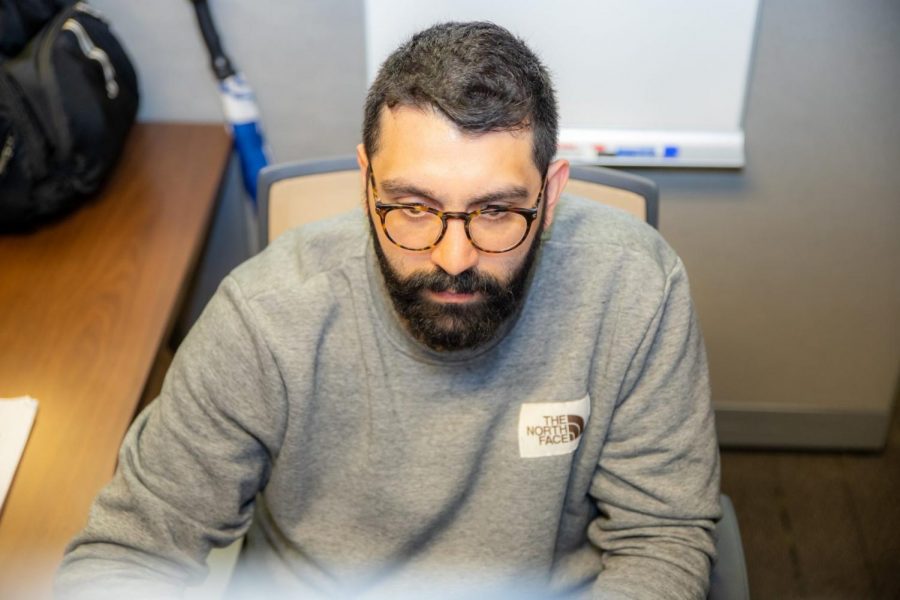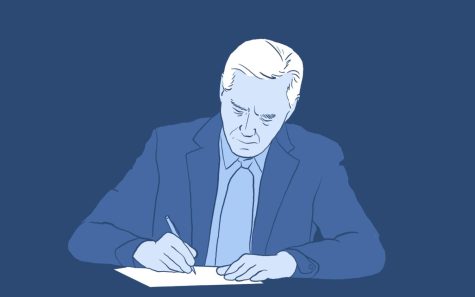From Syria to DePaul: Developer reflects on role in starting Syrian revolution
Jonathan Aguilar | The DePaulia
Emad Mahou at his office at DePaul University.
Emad Mahou spends his days writing code and building tools for the university’s various digital interfaces as a software engineer at DePaul. But nine years ago this month, he was building something very different.
In March 2011, Mahou was building a grassroots movement that helped incite the near-decade of civil war in his home country of Syria. Instead of navigating the halls of DePaul’s administrative offices, he was navigating the streets of Damascus while trying to dodge the wrath of President Bashar Al-Assad’s forces.
“When I was 23, I was fighting in Syria for freedom. I was leading the revolution 2011, but today I have to do a login for a trustee,” he said.
Mahou was born in Lebanon in 1989 to a Lebanese mother and Syrian father. His family immigrated to Syria when he was 6, settling down just outside of Syria’s capital, Damascus. Though he began studying architecture at the University of Damascus when he was 20, he never got to finish his degree. Civilian results — which would later be known as the Arab Spring — began three years later in Tunisia and Egypt, forcing the countries’ respective leaders to step down.
As these unprecedented events unfolded, Mahou said he felt it was time to force a change in Syria.
Hafez Al-Assad ruled Syria from 1970 until 2000 when he was succeeded by his son, Bashar. Hafez had ruled Syria oppressively, and there was hope the younger Al-Assad would be more humane. However, in the 11 years after his tenure began, Bashar cultivated a reputation as an autocrat just as, if not more, unsparing as his late father.
He impeded any democratic processes that might result in his removal from office and reared brutality by preventing dissidents from leaving the country, torturing and murdering them.
Dissatisfaction with the authoritarian leadership, mixed with economic tensions exacerbated by climate-induced displacement and lack of resources, bred fertile ground for Syrians to spark a revolution.
Political dissent has always been one of Mahou’s guiding principles. He said his father originally left Syria for Lebanon after its regime targeted him for his opposition to it.
Mahou began organizing by creating a Facebook page titled “The Syrian Revolution Against Assad.” He set up a meeting in February; no one showed up. Then another, with the same result. Finally, on March 15, 2011, about 25 men and women joined him at the Umayyad Mosque in Damascus. They chanted tunes of protest in the mosque, then trickled outside and marched down the Ottoman-era bazaar that served as a hub of commerce and socialization in the city.
“Everybody was silent. You could only hear our voices. Everybody was scared to death,” Mahou said. “That’s the most amazing kind of fear that can be instilled, of just witnessing somebody doing something against the government.”
Only minutes later, Al-Assad’s military stormed through the market and the protest disbanded, Mahou said. Two days later, he and his father joined a demonstration at the Interior Ministry.
Mahou was horrified by the bloodbath he saw when, again, the police raided the protest and began beating the participants.
As the protests spread across the country, Al-Assad began to escalate his counterattacks, which in turn drove the desire to oust him from power.
“I lost fear when the revolution started. When they killed people, we weren’t scared; it was fuel. They made us more angry,” Mahou said.
As the conflict grew from weeks into months and from hundreds of people to thousands, Mahou continued to organize. He said he was contacted by the United States government to help them understand and verify the situation and identify rebel groups that weren’t too radical to work on common efforts with.
Cécil Shea, senior fellow on Global Security and Diplomacy at the Chicago Council on Global Affairs, said this was a frequent measure taken during that time.
“One of the things the U.S. government was trying to do was bring some of the groups that were not so extreme, that the U.S. would have liked those to come to power, together to have meetings with the leaders and to have them coordinate,” Shea said.
Mahou pledged to himself to always remain nonviolent.
“We’re not killing Assad, we’re killing each other,” Mahou said, reflecting on his thoughts at the time. “If I met my maker I wanted to say I tried, I put all my might and power into this without causing more harm.”
His conviction was compounded by personal loss. During one march, he was walking next to a friend when the man was shot by police.
“He died in my arms,” Mahou said. “I’ve seen a life be taken away. I cannot put that pain on somebody else.”
Three thousand miles away in England, foreign news correspondent James Longman’s life was about to be altered by the stirring strife in Syria. Longman has now traveled to countries around the world for his work with ABC and The BBC. But in 2011, he was just a student studying the Middle East.
Longman went to Syria to do research for his thesis, but began freelancing for British press after realizing that as a student, his presence wouldn’t alert authorities like credentialed reporters would. He was connected with Emad through a Syrian academic living in London. He said the reason he’s a journalist today is because of the work he did in Syria — which he said was made possible by Mahou.
“Without him, I wouldn’t have been able to do anything,” Longman said. “He was someone who I could trust because in that very hectic environment, you know, you never know who you’re with.”
Mahou connected Longman with sources and got him from town to town, safehouse to safehouse — all the while making sure they weren’t being trailed by the government.
As rebellion turned into full-out war, Mahou essentially became a spokesperson for the rebellion. Because he was fluent in English, active online and had information from the ground, he became a source for journalists overseas, giving accounts of the turmoil happening around him. In one such interview with SkyNews, the journalist ended the segment by thanking Mahou, attributing him with his first and last name.
That mistake gave the regime a face and a name to attach to the movement.
About a week later, he was apprehended by police. He said he was then imprisoned for over 100 days. He was tortured for many of them.
“They zip tied me to a small bar and left me standing there for two days,” Mahou said, illustrating one of the more painful stretches of his imprisonment.
He said he doesn’t know why he was released, but guessed that because he didn’t crack under torture, the police thought he’d provide them more information on the rebels if they let him go and surveilled him.
Instead, he went into hiding, harbored for two months by a family to whom he said he owes his life. During that time, his father was arrested and four of his cousins were killed. He knew he couldn’t openly organize anymore without risking rearrest or endangering others. He had to leave Syria.
With aid, he illegally crossed into Jordan, and reached the Zaatari Refugee Camp in Ar-Ramtha. After five days in the camp, he went to Amman, where he stayed for six months until obtaining status as a political asylee, making it possible for him to immigrate to the U.S.
At the time, Mahou knew of three U.S. cities: New York, Los Angeles and Chicago. He deemed New York too big and Los Angeles too crowded, so he settled on Chicago. He ignored state department officials who warned him that Chicago might be too cold.
“Holy god this is cold,” he recalls thinking during his first January in Chicago.
When he arrived in July 2012, he walked out of O’Hare with $203 in his pocket. The nonprofit World Relief picked him up at the airport and set him up in an apartment in Albany Park, with one month of rent covered. The architecture credits he’d amassed meant nothing because the Syrian government wouldn’t recognize them.

While transitioning into his new life, Mahou was also assisting people in their transition from place to place. His first job was driving people between gates at the airport. In 2014, he went back to school, this time for computer science, knowing it was an education that could make him a living. He was hired at DePaul after graduating.
But Mahou never lost his political roots. He joined DePaul’s Staff Council, the governing body that advocates on behalf of all the non-faculty staff of the university. He’s now applying for law school, hoping to become a defense attorney.
“I want to fight for people again, the people who don’t have a voice,” he said.
In 2018, Mahou became a U.S. citizen and voted for the first time in the midterm election of that year. Watching Donald Trump’s rise to power, he said he’s reminded of the regime he battled back in Syria. It has made civic engagement something he’s passionate about.
He delivered a speech on the topic when he gave a TEDxTalk last year.
“You can’t just rely on saying we’ll always be a democratic nation, we’ll never be an autocracy,” he said. “The greatest democracy we have is the one we choose for ourselves and we protect it by voting for it.”
Ultimately, he wants to hold public office himself and plans to run for Congress one day.
“I want to play on the big stage,” he said “I want to bring the same rebel fire into the U.S. Congress.”
Although the two haven’t kept in touch over the years, Longman isn’t surprised to hear of Emad’s ambitions.
“He’s a very bright, driven and passionate guy, and he’s been through a lot,” Longman said. “I can well imagine that that would be a path and because he’s done so much more in his young life than most people will ever do in their lifetimes.”
For now, Mahou will continue updating interfaces and fixing computer bugs by day and playing with his young daughter, Sophia, by night.
But his experiences have shown him that no circumstance lasts forever, he said.
“In 2012, I was pushing people from gate to gate in O’Hare Airport,” Mahou said. “Six months before that, I was leading a revolution in the heart of Damascus. Today, I am building sites for the DePaul trustees. In 10 years, I could be a DePaul trustee.
“You’re the captain of your soul; you shape your future.”
CORRECTION — March 3, 2020: A previous version of this article contained a claim which misinterpreted a political opinion of Emad Mahou. It has been removed from the story.







